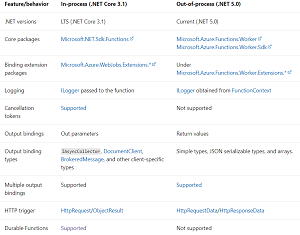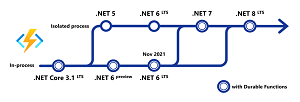News
Azure Functions 4.0 Preview Out with Support for .NET 6
Azure Functions 4.0 is out in a public preview, complete with support for the upcoming .NET 6.
The offering is used for serverless cloud computing, wherein chunks of code -- functions -- respond to events, triggering some type of functionality. It's the Azure equivalent of AWS Lambda and Google Cloud Functions.
After providing support for .NET 5 in March, the dev team gave developers a sneak peek of Azure Functions on .NET 6 in June.
That .NET 5 support, for technical reasons, had to move to an out-of-process model that runs a .NET 5 worker process alongside the runtime. Thus the new public preview comes with two programing models, one in-process (the model in .NET Core 3.1) and one isolated.
 [Click on image for larger view.] Differences with .NET Class Library Functions (source: Microsoft).
[Click on image for larger view.] Differences with .NET Class Library Functions (source: Microsoft).
"With the in-process programming model and Azure Functions 4.0, you can write .NET 6 function apps that take advantage of advanced features such as Durable Functions," Microsoft's Anthony Chu said in a recent blog post. "".NET 6 is also supported in Azure Functions 4.0 using the isolated process programming model. The isolated model gives you full control over the language worker startup configuration and provides useful features like dependency injection and middleware. Currently, you can use the command line to create and deploy your .NET 6 isolated apps. .NET 6 isolated process support is coming soon to Visual Studio and Visual Studio Code."
 [Click on image for larger view.] Future of .NET on Azure Functions (source: Microsoft).
[Click on image for larger view.] Future of .NET on Azure Functions (source: Microsoft).
Azure Functions 4.0 supports these programming languages and runtimes:
- NET 6.0 (in-process and isolated process)
- Node.js 14
- Python 3.7, 3.8, 3.9
- Java 8, 11
- PowerShell 7.0
- Custom Handlers
While the team works to provide a ready-to-go product in time for the general availability release of .NET 6 next month, some breaking changes will be introduced, which can be tracked with the help of a subscription to App Service Announcements.
About the Author
David Ramel is an editor and writer at Converge 360.